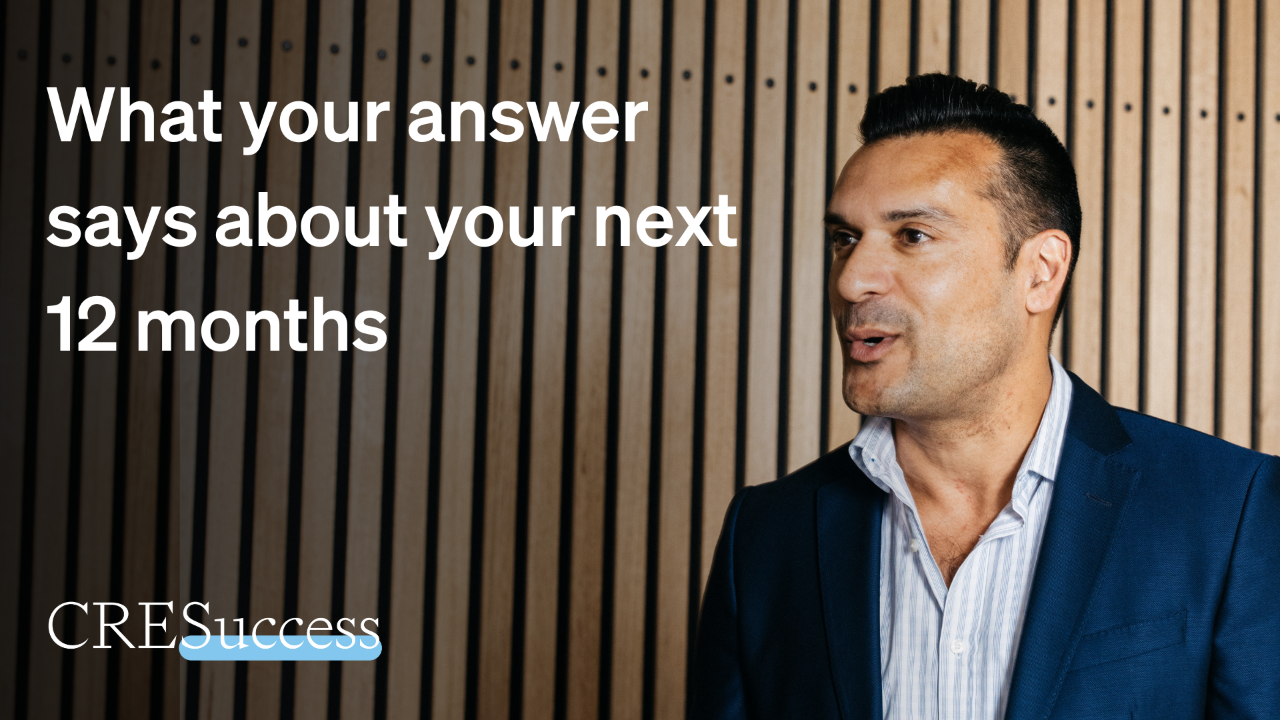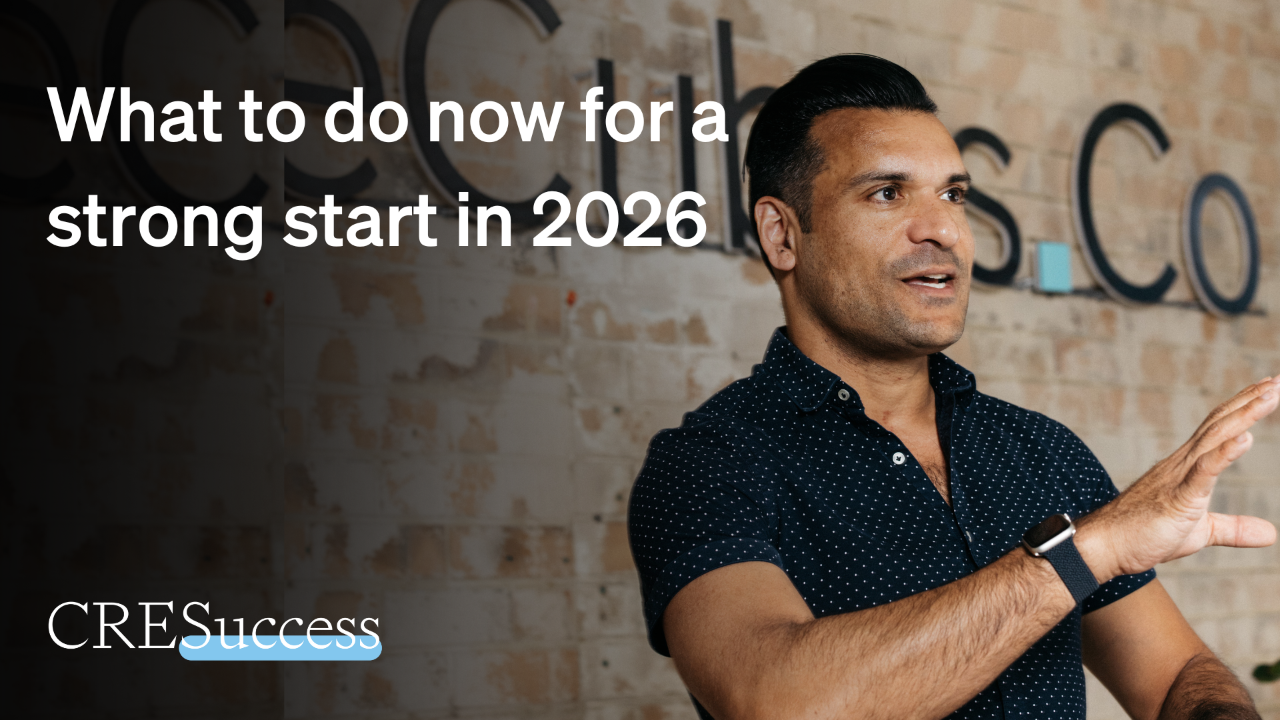Systems are the secret to achieving big results in your business.
Mar 12, 2025
CRE Success Principle: The best businesses don’t just run on talent; they run on systems. The more you refine and improve your processes, the more predictable—and scalable—your success becomes.
I reckon James Clear, the author of Atomic Habits, said it best:
"You don't rise to the level of your goals; you fall to the level of your systems."
Big ambitions are great, but without the right systems in place, they may never be realised.
If you want real results, you need to take the time to create systems that will drive consistency and raise efficiency.
So I’m breaking down the importance of systems and processes, including why every business should have them.
The systems you set up don’t have to be complicated…they can be basic checklists, detailed SOPs, or even screen recordings of you talking through the work.
The key is to ensure that your processes are documented, simplified, and followed—because even the best system is useless if no one sticks to it.
If you’re ready to start building the systems that will lay the groundwork for scalability, join me for episode 211 of Commercial Real Estate Leadership.
Episode transcript:
James Clear is the author of the book ‘Atomic Habits’, and he's got a great line.
He says, “You don't necessarily rise to the level of your goals, but you will fall to the level of your systems.”
Now this statement means that while we can all set ambitious goals, and that provides us with direction and motivation, it's the consistent well-designed systems that we put in place that ultimately determines what gets accomplished.
So, if you've got some big lofty goals and you want to increase the likelihood that they're going to be achieved, we need to have the right systems in place to support those targets.
Let's have a discussion about it.
Hello, welcome to episode 211 of Commercial Real Estate Leadership. I'm Darren Krakowiak, I'm your host.
Thanks so much for joining us for another episode of the show.
We're here to help commercial real estate principles to get the right people on their team.
Serving ideal clients inside a business that just works.
And when people want to create a business that just works, one of the things that we need to have in place in order to make that happen is to have the right systems in place.
And when I'm talking to commercial real estate principals, that's probably one of the things that they most desire to have that they don't currently have, that is systems in place.
So, do we have systems?
And then for those who do have systems, and by the way, you do have systems, you might not know it or not, but you definitely do have systems in your business.
The question then is, well, are we following them?
Are these systems complete?
Are they comprehensive?
Are they correct?
And can we improve them?
Now, in our recent episodes, I've shared a number of systems with you that are designed to help you get the right people on your team.
So, we shared the upgrading your recruitment, your hiring process.
And I've also shared some ideas on how you can serve ideal clients through some of the client acquisition systems that we talked about in that series of episodes where we, for example, rolled out the prospecting power hour and various referral systems.
So, I've created some processes and systems for you over those past 6 episodes.
Three episodes where we were focused on recruitment.
Three episodes where we were focused on client acquisition.
And if you want to grab those systems, the Upgrade Your Hiring Process is available at cresuccess.co/recruitment
And the Prospecting Power Hour Playbook is available at cresuccess.co/power
And you can have a look through those and you'll see that they're not terribly complicated because the system doesn't need to be complicated.
A system can be as simple as a checklist.
It might be as detailed as SOP (Standard Operating Procedures).
It could be a screen recording of you doing something while explaining what you're doing, that could become a system.
And it could also be embedded within the software that you used.
So, your software is the system, right?
Your PM software determines the system that you have for delivering PM services, for invoicing, for managing maintenance.
Same with your CRM. Your CRM provides you with a system for managing pipeline.
Now, systems I believe need to be documented, simplified and followed.
So, for a system to actually be a process that is leveraged by the business, needs to be documented.
So, we need to have, like, got it out of somebody's head and actually written down somewhere, so other people can use that information, and it can be sourced without actually having to speak to the person with the current responsibility for that task.
So, if someone is away out sick, on holidays and someone else needs to run with that, we need to have documented what it is that that person's doing.
So that's the first step to a system or a process actually being in place correctly.
We need it to be documented. We need it to be simplified.
When it comes to being simplified, we just want someone with a reasonable level of skill and knowledge about the business to be able to understand and follow the process.
And the last thing is that systems need to be followed.
So, systems and processes need to be practiced, otherwise, they're not much use, right?
We've got to follow them to minimize errors, to ensure service delivery standards and to provide a level of consistency.
Now, some of the things that you may think are obvious or just common sense would fall into the category of things that should be systems.
So, just because something seems like obvious, you might say, “Well, we don't need to actually create a system or a process around that.”
Well, just remember that two people's concepts of common sense can be quite different.
And even if we all agree on what common sense is, common sense is not common practice.
So, we can insure against that by creating a system for how everyday things get done in the business.
And an additional bonus I think for having systems is that your systems can become your marketing.
So, you can demonstrate the level of detail and care that you take with the marketing and selling or leasing of property through your systems.
You can show prospective clients the systems that you have, and that becomes part of your marketing, that becomes part of the value proposition that you're offering to prospective clients.
So, I just want to run through right now just a few different types of systems that you can have in your business.
This can go forever, this section. I'm just going to highlight a few here.
And these are all things that you would be doing currently, and you might just be doing them instinctively, or people are just doing them the same way they've always been done.
But the opportunity here is to create a system to document, simplify, and then make sure it's being followed.
And on top of that, I think, our systems and our processes aren't static, they aren't frozen in time.
We always want to be improving them because of advances in technology, because of improvements in the way things are done, because of changing client expectations.
So, let's go through this list and see what comes up.
The first one I've got is systems to take care of your existing customers.
So, how do we deliver annual property management statements, for example.
I had an experience with my property manager who manages residential property, that they changed brands halfway through the year and they sent out two different income statements.
And then I sent all my income statements to my accountant.
And I didn't know that only half of the revenue was shown on the income statement because they gave me two different statements, and I just looked for one out of my email and then send that across to the accountant.
So that wasn't a very good system in my opinion. They could have told me about that.
But that's an example, right? Every year on the 1st of July, they send me out the statements and I know just to look in my email, and that's where they are.
Another thing that you can do to satisfy your clients is just to acknowledge anniversaries of when they started working with you or when they purchased a property.
And also, what's our system for surveying them about client satisfaction levels?
We need systems to hire, ‘Upgrade Your Hiring Process’, we just ran through that in a previous episode.
And also, systems to onboard people, making sure that all the things that need to be done before they arrive for their first day have been done, and then planning out what their first day and orientation and introduction to the way that we do things is going to play out over those critical first few days.
We need to have systems for when people leave the business.
An exit interview process would be an example of that, making sure we're collecting all of the company property.
These are all things that need to be done each time, and we want to make sure we've documented, simplified, and then follow what that process is.
We need systems for assessing performance, for reviewing salaries, for paying out variable compensation.
We need systems for prospecting, the ‘Prospecting Power Hour’, which we went through in our last episode.
We need systems for delivering listing presentations.
So, not just a template, we need some instructions on what should be in the template.
We need systems for responding to RFPs and also for establishing new listings.
Getting the authority in place, making sure that vendor paid advertising has been agreed.
We need systems then for getting the listings onto online portals, including copywriting, photography, and the resources that need to be completed for auto responders in those portals.
We need systems for launching marketing campaigns.
Are we doing a soft launch to our VIPs? When do we post it on social media? Are we going to email our lists?
We need to have a system around our inspections.
So, what is your expectation as a principal of when an agent should arrive for a 2 p.m. inspection? What time should they be at the property? What time should they set things up and be ready to go?
I think this is the one thing that keeps a lot of leaders doing things themselves because they don't believe that somebody else is going to do it as well as or to the same standard as they would.
The way to make it more likely that your expectations are going to be met is to create a system, make sure that people can actually understand it and then keep them accountable to following it.
We need systems around vendor reporting’s.
How often should vendor reports be sent? What format should they be in? What should they include?
Are our vendor reports supported by a phone call the same day, the following day, etc.?
We need systems for negotiations.
How are we tracking negotiations? Are we doing it all in consultation with the client or are there some things which we have the authority to negotiate for our client on? Are we setting and meeting deadlines in our negotiations, for example?
We need systems for running auctions.
So, when should the flag be up? When should the brochures be on the table? Who's going to be working the crowd?
We need systems for executing contracts, for taking deposits, for closing out deals, including invoicing, paying out commissions.
We need systems for receiving client feedback, including how complaints should be handled.
A few other areas while I'm on a roll is email marketing.
Who formats the email? How long should the email be? What is the tone of voice? What segments of the list receive which emails?
Do we have a limit on how many emails one recipient can receive in one week, and how are we managing that?
We also need systems for our social media marketing, including who's providing the visuals, who's drafting the copy, and who's actually scheduling it and posting it.
And also, systems for dealing with overdue invoices and handling arrears within your property management portfolio.
Now, as I said, you're probably doing all of these things, and the way that you're currently doing them is your system.
All you need to do now is to document, to simplify and ensure that it's being followed, and then that system becomes a repeatable process.
So, my question for you is, what knowledge do you already have that you want to get captured within a process or create a system about?
What knowledge do you need to create a more robust system?
And what steps are currently being missed or maybe completed haphazardly that you'd like to see done more consistently?
I'll give you just one insight into how something gets done in my business to provide you with some ideas on how this system actually comes to be.
So, we've got a system for this podcast, right?
So, let's go through what the system is.
Before this podcast, I'm drafting notes in one note, which is my sort of note system in Microsoft, where I'm just planning out the episode and coming up with all the ideas. I'm doing a brain dump over a couple of days.
At some point, I'm ready to record the episode and I use a certain program for that because we record with video and also audio.
Once the recording's done, I then send that to my virtual assistant. I put it in a Google Drive.
My virtual assistant's name is Mary.
Mary then does a number of things including editing the raw video and audio. She transcribes the episodes and she runs that transcript through ChatGPT and sends me the outputs.
I then review those notes, and that helps me then to draft an episode title, to write the show notes, and to draft a few social media posts to nominate a video clip to be featured in a reel on Instagram or on a LinkedIn video.
I write the blog. I write an email to my list to promote the episode.
And then I send those back to Mary. And she takes what I've done.
She makes further sort of fine-tuning edits to the audio and the video. She creates the episode thumbnails. She uploads the episode to our podcast provider. She uploads it to YouTube.
She creates the blog. She formats and schedules the weekly emails. She creates the video clips, and she schedules the posts on various social media channels.
And before this episode, I went to monday.com, which is what we use for work management. And it just lists all the things that need to be done in the podcast. And we've got that document there.
So, if Mary was sick one week, for example, someone else potentially could come in and it probably wouldn't be done anywhere near as good as she's doing it currently.
But at least I would know the steps that I need to follow if she was unavailable and I got someone else to do it, or if I was left having to do it myself.
So, one other thing I want to say about processes is I'm always looking for ways to improve it.
So, I've just started to engage a copywriter who's going to help me with the stage of the process where I mentioned, like, where I'm deciding on the episode title, where I'm writing the blogs and the emails and the social media posts.
I've decided that I want to maybe outsource that and get a professional copywriter to do it. So, we'll start to do that soon.
And because I understand the process, because I understand the time that's involved, along with the value of my time, I was able to make a more informed decision about whether this copywriter could do the task, and also whether what they were proposing represented value for me.
So, look, that is a little bit about systems. As you probably have noticed, we did three episodes on recruitment, we did three episodes on client acquisition.
We're going to do three episodes on systems. That's the first one. Just to introduce the topic to you.
Make sure you come and join us for our next couple of episodes where we're going to dig deeper into the topic of installing systems in your business.
That is our episode for today. Thank you so much for listening, I will speak to you soon.








